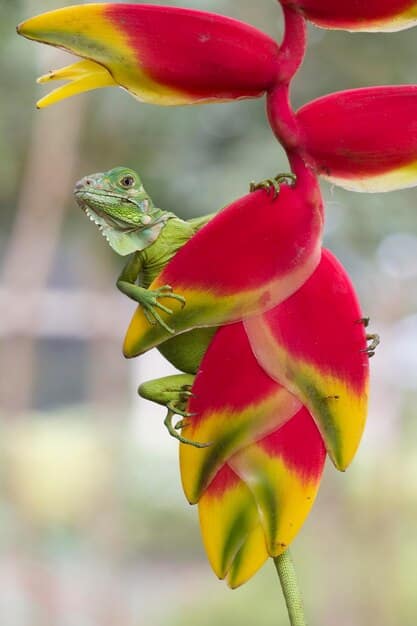Exotic Pets in the US: Unveiling the Surprising Trends & Concerns

Anúncios
Exclusive Report: The Surprising Rise of Exotic Pets in the US – Trends and Concerns reveals a growing trend in American households, highlighting the increasing popularity of non-traditional pets like reptiles, amphibians, small mammals, and birds, while also addressing the ethical, ecological, and public health concerns associated with this trend.
The American pet landscape is undergoing a fascinating transformation. Forget the traditional dogs and cats for a moment. An Exclusive Report: The Surprising Rise of Exotic Pets in the US – Trends and Concerns is capturing attention, revealing a burgeoning market of creatures not typically found in the average household. What’s fueling this trend, and what are the potential ramifications?
Anúncios
The Allure of the Unusual: Why Exotic Pets?
The increasing popularity of exotic pets in the US isn’t just a random occurrence. There are several factors contributing to this trend, ranging from changing lifestyles to a desire for unique companionship experiences. Let’s explore the key drivers behind this growing fascination.
While dogs and cats remain the most popular pets, many Americans are seeking animals that better fit their lifestyle or offer a more distinctive experience. What once seemed confined to zoos or specialized breeders is now increasingly making its way into suburban homes.
Anúncios
Changing Lifestyles and Preferences
Apartment living and busy work schedules are prompting people to consider pets that require less space and attention than traditional animals. Exotic pets often fit this bill, making them more appealing to those with limited space or time.
The Quest for Uniqueness
In a world where individuality is celebrated, owning an exotic pet can be a statement of personal style. These animals offer a distinctive alternative to mainstream pets, adding a touch of novelty and intrigue to one’s life.
- ✨ Media Influence: Documentaries and TV shows showcasing exotic animals in a positive light can ignite interest and increase desirability.
- 🤝 Specialized Communities: Online forums and local groups dedicated to specific exotic species provide support and information for potential owners.
- 🛍️ Availability: Increased availability of exotic pets through breeders, pet stores, and online marketplaces makes them more accessible than ever before.
The reasons for wanting an exotic pet are diverse, but they all point to the same conclusion: a shift in perception and accessibility that has broadened the definition of what it means to be a pet owner in the United States.

Decoding the Exotic Pet Market: What’s Trending
Understanding the exotic pet market requires diving into the specific species gaining popularity and analyzing the demographics of the owners. It’s a diverse market driven by individual tastes and practical considerations.
While some owners are drawn to the more conventional animals, others are more interested in finding something unique and uncommon. The market reflects this demand by offering a constantly evolving array of creatures that cater to specialized interests.
Reptiles and Amphibians
Geckos, snakes, lizards, and turtles are particularly popular, often chosen for their manageable size and relatively low maintenance requirements.
Small Mammals and Birds
Sugar gliders, hedgehogs, chinchillas, and a wide variety of exotic birds are also gaining traction, offering a blend of charm and manageability.
- 📈 Geographic Hotspots: States with milder climates and larger populations tend to have higher concentrations of exotic pet owners.
- 👪 Demographics: Younger adults and families with older children are generally more open to owning exotic pets.
- 💰 Market Value: The exotic pet market is estimated to be worth billions of dollars annually in the US, contributing to the overall pet industry.
The exotic pet market doesn’t operate in a vacuum. Supply and demand are heavily influenced by breeders, wholesalers, and online marketplaces. Understanding these dynamics is vital for both owners and regulatory bodies.

Ethical Crossroads: Welfare Concerns and Conservation
The rising popularity of exotic pets raises serious ethical questions about animal welfare and conservation. Ensuring the well-being of these animals while protecting wild populations presents a complex challenge.
Unlike domesticated pets, exotic animals often have very specific needs that are difficult to replicate in a domestic environment. This can lead to health issues, behavioral problems, and a diminished quality of life.
Animal Welfare
Many exotic pets are sourced from unsustainable breeding programs or even taken from the wild, causing immense stress and potential harm to the animals.
Conservation Challenges
The demand for certain exotic species can fuel illegal wildlife trade, further endangering already threatened populations.
- 🛡️ Regulations: Strengthened regulations and enforcement are crucial to ensure responsible breeding, trade, and ownership practices.
- 🐾 Owner Education: Educating prospective owners about the specific needs of exotic pets is essential to promoting animal welfare.
- 🌍 Conservation Partnerships: Collaboration between conservation organizations, zoos, and pet owners can help protect and preserve endangered species.
Responsible pet ownership extends beyond providing food and shelter; it involves understanding the deeper implications of acquiring an animal that belongs to a wild ecosystem.
Ecological Risks: Invasive Species and Disease Transmission
Exotic pets can pose significant ecological risks, especially when released into the wild. Invasive species can disrupt ecosystems, threaten native wildlife, and even transmit diseases.
The unintentional or intentional release of exotic pets can have far-reaching consequences. Animals that can survive and reproduce in a new environment often outcompete native species, leading to imbalances and ecological damage.
Invasive Species
Species like Burmese pythons in Florida are a stark reminder of the potential devastation caused by exotic pets released into the wild. These snakes have decimated native wildlife populations and altered the state’s ecology.
Disease Transmission
Exotic pets can also introduce new diseases into an ecosystem, impacting both animal and human health.
- 🚫 Prevention: Preventing the release of exotic pets is fundamental. Education and stricter regulations are necessary to discourage irresponsible ownership.
- 🚨 Early Detection: Implementing monitoring systems to detect and control invasive species populations is critical for mitigating ecological damage.
- 🧪 Biosecurity: Maintaining strict biosecurity protocols for exotic pet owners and breeders can help prevent the spread of diseases.
The ecological consequences of exotic pet ownership underscore the importance of responsible planning, ethical awareness, and proactive measures to safeguard ecosystems.
Public Health Concerns: Zoonotic Diseases and Safety
Owning exotic pets comes with potential public health risks, primarily related to zoonotic diseases—illnesses that can be transmitted from animals to humans—and potential physical harm.
While the joy of owning an exotic animal is undeniable for many individuals, it’s important to recognize that these animals can carry bacteria, viruses, and parasites that can cause sicknesses in humans. Furthermore, some larger or more aggressive species can pose a safety risk.
Zoonotic Diseases
Reptiles, for example, can carry Salmonella bacteria, which can cause gastrointestinal illness in humans. Other exotic pets can transmit diseases such as monkeypox or avian flu.
Safety Risks
Large snakes, primates, and certain bird species can be aggressive and pose a safety risk, especially to children and vulnerable adults.
- 🩺 Health Protocols: Regular veterinary checkups for exotic pets can help identify and manage potential health threats.
- 🧼 Hygiene: Practicing good hygiene—such as handwashing after handling exotic pets—is essential for preventing disease transmission.
- 🔒 Secure Housing: Providing secure housing and appropriate handling techniques can minimize safety risks.
Protecting public health requires a combination of responsible pet ownership, robust veterinary care, and adherence to safety guidelines.
Navigating the Legal Maze: Regulations and Ownership
The legal framework governing exotic pet ownership varies widely across the United States, creating a perplexing patchwork of regulations that owners must navigate.
Some states and municipalities have strict bans on certain exotic species, while others have more lenient policies. Understanding these laws is crucial for responsible pet ownership.
Varying State Laws
Certain states require permits, licenses, or microchipping for specific exotic animals, while others have complete bans. Restrictions may vary based on the animal’s species, size, or perceived danger level.
Local Ordinances
In addition to state laws, local ordinances may impose additional restrictions. It’s vital for owners to understand both state and local regulations to avoid legal complications.
- 📚 Research: Prospective owners should thoroughly research state and local laws before acquiring an exotic pet.
- 📜 Compliance: Complying with all applicable regulations, including obtaining necessary permits and licenses, is non-negotiable.
- 🗣️ Advocacy: Engaging with policymakers to advocate for responsible exotic pet ownership laws can promote animal welfare and public safety.
A comprehensive understanding of the legal landscape is an essential component of responsible exotic pet ownership, helping to ensure compliance and promote ethical practices.
| Key Point | Brief Description |
|---|---|
| 📈 Market Growth | Exotic pets are gaining popularity, driven by lifestyle changes and uniqueness. |
| 🐾 Ethical Concerns | Animal welfare and conservation are critical issues in exotic pet ownership. |
| 🌍 Ecological Risks | Invasive species and disease transmission pose threats to ecosystems. |
| ⚕️ Public Health | Zoonotic diseases and safety risks must be carefully managed with exotic pets. |
Frequently Asked Questions
▼
Exotic pets encompass a wide range of non-traditional animals, including reptiles, amphibians, small mammals like sugar gliders and hedgehogs, various bird species, and even some invertebrates. These are generally species not domesticated for companionship over centuries.
▼
Several factors contribute to their rise, including changing lifestyles, a desire for unique pets, and increased availability through breeders and specialized pet stores. Social media and documentaries also play a role in normalizing and sparking interest in these animals.
▼
Ethical concerns primarily revolve around animal welfare—ensuring exotic pets receive appropriate care and living conditions—and conservation, preventing exploitation of wild populations. Many are sourced unsustainably, leading to stress, health issues, and potential endangerment.
▼
Exotic pets can become invasive species when released, disrupting native ecosystems and outcompeting local wildlife. They may also introduce diseases harmful to both animal and human health. This is why responsible pet ownership is extremely important.
▼
Regulations vary significantly by state and local jurisdictions. Some areas ban certain species outright, while others require permits, licenses, or microchipping. Prospective owners must thoroughly research and comply with all applicable laws to ensure responsible ownership.
Conclusion
The increase in exotic pet ownership in the United States underscores a complex interplay of personal desires, ethical considerations, and environmental responsibilities. While the allure of the unusual is undeniable, it is vital that prospective owners weigh the implications of owning these unique animals.






